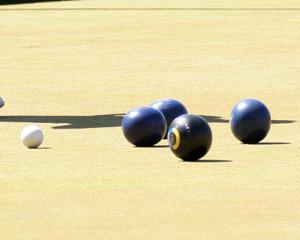Bowls New Zealand wants to increase its registered membership by bringing casual and social bowlers into the fold.
Numbers are declining under the present system, which ignores people who want only to have the occasional social game and are not registered with clubs.
Bowls New Zealand plans to adopt a new registration system to increase the number of players in the sport.
‘‘It is a change from a membership fee based on each individual to a membership fee based on each club,'' Bowls New Zealand chief executive Kerry Clark said.
Clark was in the city last week to explain the new system to representatives from Dunedin clubs.
In its most recent annual report, Bowls New Zealand had slightly more than 27,000 bowlers categorised as full playing members of the 529 clubs.
Clubs also told Bowls New Zealand they had additional categories of people as members of their clubs and that took the numbers out to 40,000.
‘‘But they also had people using their club for business house or ‘Mates in Bowls' leagues,'' Clark said.
‘‘This took the numbers up by another 75,000. That figure has continued to increase over recent years.''
This puts the number of people playing bowls in New Zealand each year at 114,000.
‘‘There is talk about a declining number of traditional members but the people engaged in the sport are much higher,'' Clark said.
‘‘Worldwide research shows that people are more engaged in sport in a ‘pay to play' way rather than the old subscription membership way.''
The traditional form of club membership meant bowlers had to comply with the rules and be available for regular competitive bowls.
‘‘Society today won't accept that,'' Clark said.
‘‘There is a declining number of people who want to be members of clubs but an increasing number of people who want to pay to play.''
Athletics New Zealand is another sport that has increased its registered numbers by using this system with fun runs, marathons and road races.
‘‘People want to pay to play but they are not going to be told after joining a club that there are a lot of rules of what they can and cannot do,'' Clark said.
‘‘They love the sport but they haven't got the time to be more committed. We live in a time-poor society.''
Clark said sports clubs faced a volunteer shortage.
‘‘That is the big issue. We won't have enough volunteers to keep doing things the same way. In the future, we need to have clubs that are hubs for several sports and manned by paid staff.
‘‘The public are now thinking that way and we are not going to change their opinions.''
The way the new fee is being calculated for the first year is on the amount each club paid in the financial year 2015-16.
‘‘Our fees will stay at that level for at least three years,'' Clark said.
‘‘It is a change from a fee paid on individuals to a fee based on the clubs that are members of Bowls New Zealand.''
Clark emphasised that to play in any national competition there needs to be evidence that they are members of a club.
‘‘How they become a member of a club will be up to each club and not the concern of Bowls New Zealand,'' Clark said.
‘‘We have no intention of putting a fee on the 114,000. The new club fee is being based on the 27,000 traditional members.''
Clark said it was an incentive for clubs to look at different ways of using their facilities.
Taieri is an example of a bowling club using the new model. It has 150 traditional members and 300 other members.‘‘Instead of talking about the split they will now talk about a membership of 450,'' Clark said.‘‘We want to create the database of people who are playing our sport in the traditional way, in a pay to play system or in any other way.‘'
The club-based membership model is also being embraced by Australia.
‘‘The state of Victoria has been using this model for three years,'' Clark said.
‘‘Australia has now moved to a national model to be applied in all six states.
''Bowls New Zealand is holding an international conference in Christchurch on the Changing Landscape of Participation in Sport'' in November before the start of World Bowls.
Sport New Zealand has done research into this growing trend.
‘‘Sport will never die but sports organisations that don't change will struggle,'' Clark said.
‘‘The changing landscape should be looked at as a real opportunity and not as a threat to the sport.''
Speakers at the conference include Minister of Sport Jonathon Coleman, chief executive of Sport New Zealand Peter Miskimmin, New Zealand Olympic Committee secretary-general Kerryn Smith, the of World Bowls president John Bell and New Zealand Golf chief executive Dean Murphy.












